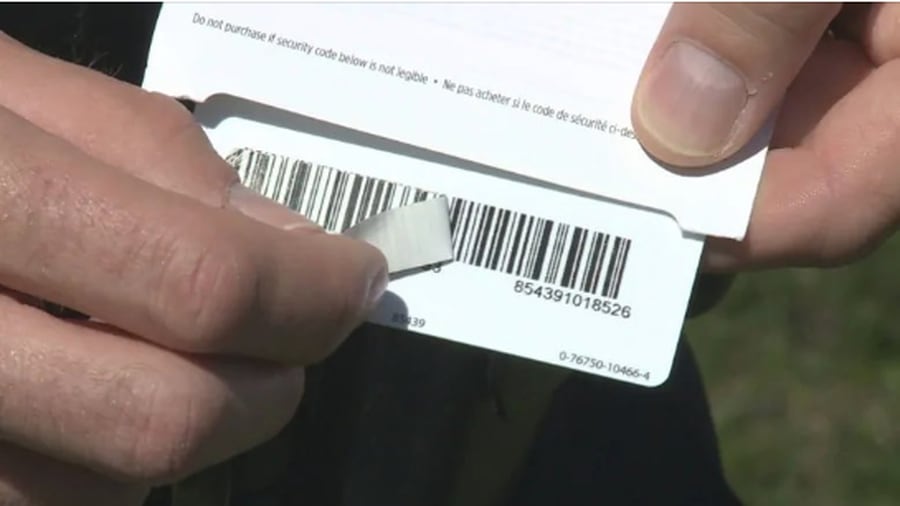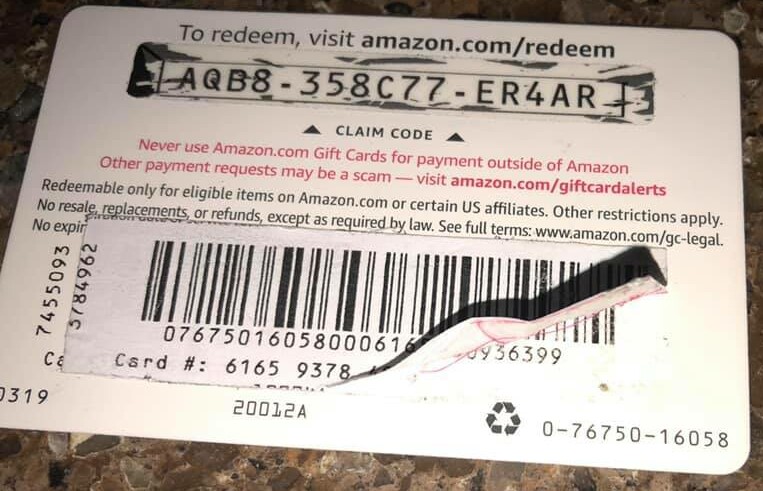Altered Gift Card Scam: Unveiling the Hidden Threat
Gift cards, a convenient and popular gifting option, have become a target for scammers seeking to exploit unsuspecting consumers by using an Altered Gift Card Scam to steal their money. One particularly insidious scam involves altering gift cards in local stores so that when the card is purchased, the credit is added to the scammer’s existing account, leaving the unsuspecting victim with an empty card and their money gone.
How the Altered Gift Card Scam Works
Scammers typically target stores that sell a variety of gift cards, including popular brands like Visa, Mastercard, Apple, and Amazon.
They carefully open the packaging of gift cards, replace the card bar code numbers, and then replace the cards back into their packaging, ensuring that no visible tampering is evident. Alternatively, they may use stickers or barcode overlays to conceal the original card numbers and replace them with their own.
Once the cards have been altered, the scammers wait for unsuspecting customers to purchase them. When the card is activated at the checkout counter, the credit is unknowingly transferred to the scammer’s account, leaving the unsuspecting victim with a card that appears valid but holds no value.
How to spot Altered Gift Cards
Spotting altered gift cards can be challenging, but there are key signs to watch for:
- Packaging Damage: Look for any signs of tampering or resealing on the card’s packaging. Wrinkles, tears, or glue marks could indicate interference.
- Scratch-Off Panels: Inspect the PIN or activation code panel carefully. If it appears scratched, peeled, or uneven, it might have been tampered with.
- Check the Code’s Consistency: The PIN or activation code should match the formatting of other cards in the store. If it looks different or out of place, it could be altered.
- Verify the Checkout Scan: When the card is scanned at checkout ask the clerk to tell you who the card was crediting. In other words, an Apple card should show as an Apple card in the register, if it says anything else, it could be altered. When in doubt ask for the store manager to ask if the card is real and untampered.
- Balance Verification: After purchasing or using the card, check the balance by calling the retailer or visiting their official website. Discrepancies in the balance could indicate a tampered card.
- Retailer’s Response: If the retailer’s employees seem unaware of the card’s condition or hesitant when asked about its legitimacy, it could be a red flag.
- Unusual Card Appearance: Be cautious of cards that look different from others on the rack, have misaligned prints, or appear oddly discolored.
While these signs might not always be conclusive, they can help consumers identify potentially altered gift cards and avoid falling victim to scams. If any suspicions arise, it’s wise to inform the store immediately.
If you feel uncertain about a gift card do not buy it!
The Impact of Altered Gift Cards on Victims
This scam can have significant financial repercussions for victims, who may lose considerable amounts of money unknowingly. In many cases, victims may not realize they have been scammed until they attempt to use the card and discover it has no balance.
The scam also poses a reputational risk to retailers, who may inadvertently sell tampered gift cards to their customers. This can damage customer trust and loyalty, leading to lost sales and negative publicity.
Protecting Yourself from the Altered Gift Card Scam
To safeguard yourself from this gift card scam, consider the following preventive measures:
- Purchase from Reputable Retailers: Stick to trusted stores or authorized retailers when buying gift cards. Avoid purchasing them from online auction sites or individuals.
-
Inspect the Packaging: Carefully examine the packaging of gift cards before purchasing them. Look for any signs of tampering, such as cuts, tears, or resealed packaging.
-
Check the Card: Once you have purchased a gift card, inspect the card itself for any irregularities, such as mismatched barcodes or stickers covering the card numbers.
- Check the PIN and Activation Codes: Ensure that the protective covering for PIN and activation codes hasn’t been scratched off or tampered with. Any signs of this should prompt you to avoid that particular card.
-
Verify the Balance: Immediately after purchasing a gift card, check the balance online or by calling the card issuer’s customer service number to ensure it has the correct value.
-
Keep Receipts and Documents: Retain purchase receipts, packaging, and activation receipts, as they can be helpful if there are issues with the card.
-
Report Tampered Cards: If you discover a tampered gift card, report it immediately to the store manager and the card issuer’s customer service department.
Retailer Responsibilities Related to the Altered Gift Card Scam
Retailers also play a crucial role in combating this scam by implementing preventive measures, including:
-
Secure Storage: Store gift cards in a secure location to prevent unauthorized access and tampering.
-
Employee Training: Educate employees about the gift card scam and how to identify tampered cards.
-
Regular Inspections: Conduct regular inspections of gift card packaging and cards to detect any signs of tampering.
-
Consumer Awareness: Raise awareness among customers about the scam and provide them with tips for identifying and reporting tampered cards.
Summary
Altered Gift Card Scams pose a significant threat to consumers and retailers alike.
By adopting preventive measures, both individuals and businesses can safeguard themselves from this fraudulent activity.
Remember to be vigilant, inspect gift cards carefully, and report any suspected tampering immediately.
When in doubt do not buy!
More:
- Major News: Gift Cards May Now Be Refundable! (romancescamsnow.com)
- Walmart Gift Card Refunds For Scam Victims (romancescamsnow.com)
- Scammers Still Love Gift Cards (romancescamsnow.com)
- Business & Personal Gift Card Scams – Don’t Pay For Anything With A Gift Card – How Scams Work! (romancescamsnow.com)
- Stop Gift Card Scams – An Overview (romancescamsnow.com)
SCARS Resources:
- Getting Started Right: ScamVictimsSupport.org
- Sextortion Scam Victims: Sextortion Victims Support – The Essentials (scamvictimssupport.org)
- For New Victims of Relationship Scams newvictim.AgainstScams.org
- Subscribe to SCARS Newsletter newsletter.againstscams.org
- Sign up for SCARS professional support & recovery groups, visit support.AgainstScams.org
- Join our Scam Survivors United Chat & Discussion Group facebook.com/groups/scam.survivors.united
- Find competent trauma counselors or therapists, visit counseling.AgainstScams.org
- Become a SCARS Member and get free counseling benefits, visit membership.AgainstScams.org
- Report each and every crime, learn how to at reporting.AgainstScams.org
- Learn more about Scams & Scammers at RomanceScamsNOW.com and ScamsNOW.com
- Scammer photos ScammerPhotos.com
- SCARS Videos youtube.AgainstScams.org
- Self-Help Books for Scam Victims are at shop.AgainstScams.org
- Donate to SCARS and help us help others at donate.AgainstScams.org
- Worldwide Crisis Hotlines: https://blog.opencounseling.com/suicide-hotlines/
Other Cyber Resources
- Block Scam Domains: Quad9.net
- Global Cyber Alliance ACT Cybersecurity Tool Website: Actionable Cybersecurity Tools (ACT) (globalcyberalliance.org) https://act.globalcyberalliance.org/index.php/Actionable_Cybersecurity_Tools_(ACT)_-_Simplified_Cybersecurity_Protection
- Wizer Cybersecurity Training – Free Security Awareness Training, Phishing Simulation and Gamification (wizer-training.com)
-/ 30 /-
What do you think about this?
Please share your thoughts in a comment below!
Do You Need Support?
Get It Now!
SCARS provides the leading Support & Recovery program for relationship scam victims – completely FREE!
Our managed peer support groups allow victims to talk to other survivors and recover in the most experienced environment possible, for as long as they need. Recovery takes as long as it takes – we put no limits on our support!
SCARS is the most trusted support & education provider in the world. Our team is certified in trauma-informed care, grief counseling, and so much more!
To apply to join our groups visit support.AgainstScams.org
We also offer separate support groups for family & friends too.
Become a
SCARS STAR™ Member
SCARS offers memberships in our STAR program, which includes many benefits for a very low annual membership fee!
SCARS STAR Membership benefits include:
- FREE Counseling or Therapy Benefit from our partner BetterHelp.com
- Exclusive members-only content & publications
- Discounts on SCARS Self-Help Books Save
- And more!
To learn more about the SCARS STAR Membership visit membership.AgainstScams.org
To become a SCARS STAR Member right now visit join.AgainstScams.org
To Learn More Also Look At Our Article Catalogs
Scam & Crime Types
More SCARS
- ScamsNOW Magazine – ScamsNOW.com
- ContraEstafas.org
- ScammerPhotos.com
- AnyScam.com – reporting
- AgainstScams.org – SCARS Corporate Website
- SCARS YouTube Video Channel
















Leave A Comment